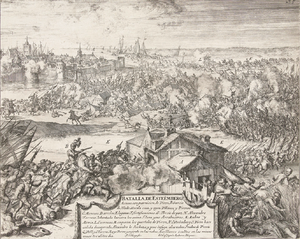| Battle of Steenbergen (1583) | |||||||
|---|---|---|---|---|---|---|---|
| Part of the Eighty Years' and Anglo-Spanish wars | |||||||
 The Battle of Steenbergen, engraving by Juan de Ledesma and Romeyn de Hooghe (1670–1699). National Library of the Netherlands. | |||||||
| |||||||
| Belligerents | |||||||
|
|
| ||||||
| Commanders and leaders | |||||||
|
|
| ||||||
| Casualties and losses | |||||||
| At least 3,200 casualties[3] | 400 dead or wounded[3][4] | ||||||
The Battle of Steenbergen, also known as the Capture of Steenbergen of 1583, took place on 17 June 1583 at Steenbergen, Duchy of Brabant, Spanish Netherlands (present-day North Brabant, the Netherlands). This was an important victory for the Spanish Army of Flanders led by Don Alexander Farnese, Prince of Parma (Spanish: Alejandro Farnesio), Governor-General of the Spanish Netherlands, over the French, English, and Dutch forces led by the French Marshal Armand de Gontaut, Baron de Biron, and the English commander Sir John Norreys, during the Eighty Years' War, the Anglo-Spanish War (1585–1604), and in the context of the French Wars of Religion.[1][2] The victory of the Spaniards ended the Treaty of Plessis-les-Tours, and Francis, Duke of Anjou (French: François de France), left the Netherlands in late June.[5][6]
- ^ a b Mack P. Holt p.190
- ^ a b James Tracy. The Founding of the Dutch Republic: War, Finance, and Politics in Holland 1572–1588
- ^ a b Biography of Don Hernando de Acosta by Juan L. Sánchez Archived October 14, 2013, at the Wayback Machine. Tercios.org
- ^ Jan Wagenaar. Vaderlandsche Historie. Volume 7 p.488
- ^ Holt p.191
- ^ Mack P. Holt p.192